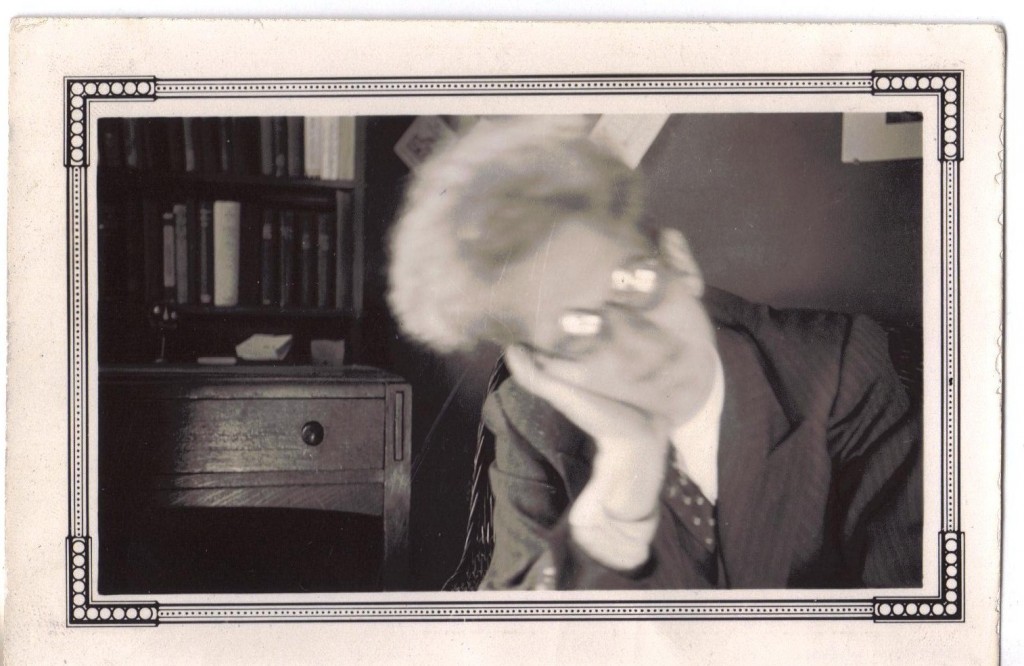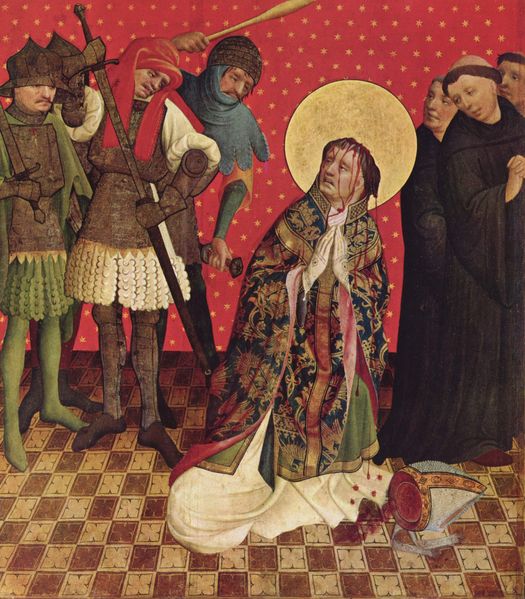Frye as a 17 year old freshman at Victoria College, 1929-1930
Author Archives: Michael Happy
TGIF: Onion News Network
httpv://www.youtube.com/watch?v=gnZOCrxzWyU
One of the first things to look forward to in the new year: the Onion News Network.
Union of Soviet Socialist Republics
httpv://www.youtube.com/watch?v=fFSTcRyeB_Q
Mikhail Gorbachev resigns as president and announces the dissolution of the U.S.S.R
On this date in 1991 the U.S.S.R. was officially dissolved, having lasted 69 years and one day.
Frye in The Double Vision:
History moves in a cyclical rhythm which never forms a complete closed cycle. A new movement begins, works itself out to exhaustion, and something of the original state then reappears, though in a quite new context presenting new conditions. I have lived through at least one major historical cycle of this kind: its main outlines are familiar to you, but the inferences I have drawn from it may be less so. When I arrived at Victoria College as a freshman in September 1929, North America was not only prosperous but in a nearly hysterical state of self-congratulation. It was widely predicted that the end of poverty and the levelling out of social inequalities were practically within reach. In the Soviet Union, on the other hand, the reports were mainly of misery and despair. The inference of general public opinion on this side of the Atlantic was clear: capitalism worked and Marxism didn’t.
Next month came the stock market crash, and there was no more talk of a capitalist Utopia. By the mid-1930s the climate of opinion had totally reversed, at least in the student circles I was attached to. Then it was generally accepted dogma that capitalism had had its day and was certain to evolve very soon, with or without a revolution, into socialism, socialism being assumed to be both a more efficient and a morally superior system. The persistence of this view helped to consolidate my own growing feeling that myths are the functional units of human society, even when they are absurd myths. The myth in this case was the ancient George and dragon one: Fascism was the dragon, democracy was the maiden to be rescued, and despite the massacres, the deliberately planned famines, the mass uprooting of peoples, the grabbing of neighbouring territories, and the concentration camps, Stalin simply had to fit into the role of rescuing knight. This was by no means a unanimous feeling — among Communists themselves there was a bitterly anti-Stalin Trotskyite group — but it extended over a good part of the left of centre.
That cycle has completed itself, and once again people in the West are saying, as they said sixty years ago, that it has been proved that capitalism works and that Marxism does not. With the decline of belief in Marxism, apart from an intellectual minority in the West that doesn’t have to live with it, the original Marxist vision is often annexed by the opposite camp. Going back to the competitive economy that Marx denounced, we are often told, will mean a new life for the human race, perhaps even the ultimate goal that Marx himself promised: an end to exploitation and class struggle. Hope springs eternal: unfortunately it usually springs prematurely. (CW 4, 167-8)
U.S.S.R
httpv://www.youtube.com/watch?v=UCu59_5dGPk&feature=related
Lenin’s declaration of the Soviet Union
On this date in 1922 the Union of Soviet Socialist Republics was formed.
Here’s Frye in “On the Nineteenth Century”:
Marx thought of Communism as a natural evolution out of capitalism: when capitalism had reached a certain stage of deadlock through its inherent contradictions, a guided revolutionary movement would shift control of production from a few exploiters to the workers. This evolutionary development did not occur: Communism was established in an essentially pre-industrial country, and became simply the adversary of capitalism, not its successor. (CW 17, 318)
Thomas Becket
Master Francke’s Martyrdom of St. Thomas Becket, c. 1424
On this date in 1179 Thomas Becket was murdered (born 1118).
Frye on T.S. Eliot’s Murder in the Cathedral:
In Murder in the Cathedral the dialectical and purgatorial aspect of the Christian “comic” action is at its clearest. The foreground action is a tragedy in which the hero knows that “. . . all things / Proceed to a joyful communion.” Of the four worlds [heaven, upper level of nature, lower level of nature, hell], there is no place for the rose garden: we begin in experience, represented by the chorus. The chorus becomes increasingly aware that experience is the doorway to hell, and as the murderers move closer the women of Canterbury are haunted by images of beasts of prey, filth, and corruption, ending in the cry: “The Lords of Hell are here.” Meanwhile Beckett is immediately involved in a sequence of temptations. The chorus describes him as “unaffrayed among the shades,” he he says himself, in language realling the Purgatory line “Treating shadows as a solid thing”: “. . . the substance of our first act / Will be shadows, and the strife with shadows.”
The first tempter, “Leave-well-alone,” presents a temptation that Becket has gone too far to yield to even if he were capable of it. Its object however is not to persude him to desert, but merely to remain in his mind as a source of distraction, confusing him in crucial moments: “Voices under sleep, waking a dead world, / So that the mind may not be whole in the present.” Temptations of compromise and of intrigue follow, but the dangerous temptation is an unexpected fourth one to “do the right deed for the wrong reason”: to preserve in integrity and die a glorious martyr’s death. This temptation is really an act of grace, something that Beckett would never even have encountered by himself, much less overcome. The fact that the fourth tempter, as he leaves, repeats, word for word, Becket’s opening speech in the play, indicates that Becket at this point has “assumed a double part,” separating his real immortal self from the unpurified part of himself. Both this theme and the theme of something apparently demonic turning out to be an agent of grace are frequent in other plays. (CW 29, 243-4)
Theodore Dreiser
httpv://www.youtube.com/watch?v=2UFj3k3IsQY
Dreiser’s article “The Factory” (1910)
On this date in 1945 Theodore Dreiser died (born 1871).
Frye in “Design as a Creative Principle in the Arts”:
The tendency of of contemporary poets, and many novelists and dramatists as well, to be attracted toward myth and metaphor, rather than toward a realistic emphasis on content, is thus a cultural tendency parallel to the emphasis on abstract design in the visual arts. It exhibits also the same paradox, or seeming paradox: it is usually a highly sophisticated, even erudite and academic, approach to the art, yet the features of the art which are most interesting to it are primitive and popular features. Dylan Thomas seems more complex and and baffling than Theodore Dreiser, yet it is easier for me to imagine Dylan Thomas genuinely popular than to imagine Dreiser, for all his obvious and considerable merits, genuinely popular. This is not to suggest a preference between two utterly incomparable things, but to suggest that writers who concentrate on literary design rather than content, despite their superficial difficulties, are the writers most likely to reach the widest public most quickly. The principles of literary design are also the readiest means by which literature can be effectively taught, at any level from kindergarten to graduate school. And as myth and metaphor are habits of mind and not merely artificial devices, such teaching should lead us, not simply to admire works of literature more, but to transfer something something of their imaginative energy to our own lives. It is that transfer of imaginative energy which is the aim of all education in the arts, and to the possibility of which the arts themselves bear witness. (CW 27, 236-7)
Charles Lamb
httpv://www.youtube.com/watch?v=qOMCCVum3d8
Chapter 1 of Rosamund Grey
On this date in 1834 Charles Lamb died (born 1775).
From The Well-Tempered Critic:
A critic may have precise and candid taste and yet be largely innocent of theory. Charles Lamb was such a critic, and one feels even that his lack of theory was an advantage to him. Coleridge, on the contrary, was one of the greatest critical theorists, and yet had much less of Lamb’s ability to respond directly to poetry without being confused by moral, religious, and political anxieties. (CW 21, 381)
Henry Miller
httpv://www.youtube.com/watch?v=NkqMupPk7d8
From the 1969 film adaptation of Quiet Days in Clichy
Today is Henry Miller‘s birthday (1891-1980).
Frye in The Modern Century:
In two writers who have strongly influenced the Freudian proletariat movement, Henry Miller and D.H. Lawrence, pastoralism is a central theme. . . In Miller and Lawrence this pastoral theme is less sentimentalized and more closely connected with the more deeply traditional elements of the pastoral: spontaneity in human relations, especially sexual relations; the stimulus to creative power that is gained from a simpler society, less obsessed by satisfying imaginary wants; and, at least in Lawrence, a sense of identity with nature of great delicacy and precision. (CW 11, 44-5)
“A Christmas Carol”
httpv://www.youtube.com/watch?v=1l1_82x2BO4
It’s a pristine print too. Better than anything you’ve seen on television. And Alistair Sim is the definitive Scrooge. (Not embedded: click on the image and hit the YouTube link.)
Merry Christmas
httpv://www.youtube.com/watch?v=fsD1zoI7NYo
Frye’s 1947 Canadian Forum Christmas editorial, “Merry Christmas?” Read it while enjoying this Yuletide fire.
A passage in the Christmas Carol describes how Scrooge saw the air filled with fettered spirits, whose punishment it was to see the misery of others and to be unable to help. One hardly needs to be a ghost to be in their position, and as we light the fires for our Christmas they throw into the cold and darkness outside the wavering shadows of ourselves, unable to break the deadlock of the UN, unable to stop the slaughter in China or India or the terror in Palestine, unable to release the victims of tyrannies still undestroyed, unable to deflect the hysterical panic urging us to war again, unable to do anything for the vast numbers who will starve and freeze this winter, and above all to break the spell of malignant fear that holds the world in its grip. Yet Dickens’s ghosts were punished for having denied Christmas, and we can offset our helplessness by affirming Christmas, by returning once more to the symbol of what human life should be, a society raised by kindliness into the community of continuous joy.
Because the winter solstice festival is not confined to Christianity, it represents something that Christians and non-Christians can affirm in common. Christmas reminds us, whether we put the symbol into religious terms or secular ones, that there is no in the world a power of life which is both the perfect form of human effort and all we know of God, and which it is our privilege to work with as it spreads from race to race, from nation to nation, from class to class, until there is no one shut out from the great invisible communion of the Christmas feast. Then the wish of merry Christmas, which we now extend to all our readers, will become, like the wish of a fairy tale, a worker of miracles. (CW 12, 248)

